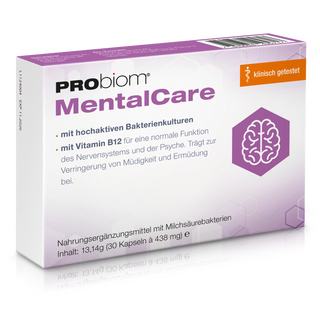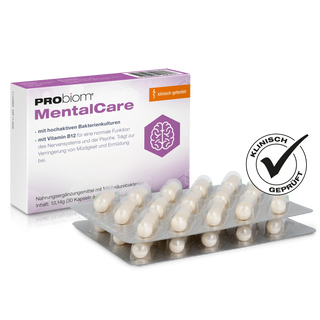Bowel problems such as bloating, diarrhea, constipation, or irritable bowel syndrome are among the most common everyday complaints. Many sufferers look for physical causes – but a crucial factor is often overlooked: the psychological. Stress, anxiety, or depression can have a significant impact on the gut. Conversely, a disturbed gut can negatively impact mental health. In this article, you'll learn why the connection between the gut and the psyche is so close, how to correctly classify symptoms, and what role probiotics can play in restoring balance.
The intestine – more than a digestive organ
The human intestine is about seven meters long and contains around 100 trillion microorganisms – the so-called microbiome . These little helpers have a tremendous impact on our health. In addition to digestion, they regulate our immune system, produce vitamins, and communicate with the brain. In fact, the intestine contains about 100 million nerve cells – as many as the spinal cord. This fact has earned it the nickname "second brain."
The close connection between the brain and gut is established via the so-called gut-brain axis . The two organs constantly exchange information via nerve pathways (especially the vagus nerve), hormones, and immune messengers. If one of the two is out of balance, the other often suffers as well.
Psychological stress as a trigger for intestinal problems
Psychological factors such as stress, anxiety disorders, or depression can have a direct impact on the gut. Under stress, the body releases increased amounts of cortisol and adrenaline—hormones that not only increase heart rate but also alter digestion. The gut can overreact, become sluggish, or react with pain.
Typical symptoms of psychologically caused intestinal problems:
-
Flatulence
-
feeling of fullness
-
Diarrhea or constipation
-
nausea
-
Irritable bowel symptoms
-
Cramps or colicky pain
Irritable bowel syndrome (IBS) is particularly common among those affected. Approximately 15–20% of the population suffers from it – many of them without a clear physical cause. Psychological influences play a central role.
The influence of the intestine on the psyche
Communication isn't a one-way street. A disturbed gut can also trigger or worsen mental health problems. An imbalance in the microbiome—e.g., after taking antibiotics, an unhealthy diet, or infections—can promote inflammation and inhibit the production of feel-good hormones like serotonin . Surprisingly, around 90% of serotonin is produced in the gut.
A weakened microbiome can therefore contribute to mood swings, fatigue, inner restlessness, or even depression. Numerous studies now support this connection. The term " psychobiotics " refers to certain probiotic bacterial strains that can specifically support mental health.
The gut-brain axis at a glance
| aspect | Function/Connection |
|---|---|
| nervous system | The vagus nerve transmits signals between the brain and the gut in both directions. |
| Microbiome | Influence on neurotransmitters, inflammation and immune system |
| Hormones | Cortisol (stress), serotonin (mood), ghrelin (appetite) – also produced in the intestine |
| Immune factors | 70% of immune cells are located in the gut – inflammation can affect the brain |
| Psyche → Intestine | Stress, anxiety, depression → irritable bowel syndrome, flatulence, diarrhea |
| Intestine → Psyche | Dysbiosis, inflammation, disturbed microbiome communication → depressive moods |
Probiotics as a link between stomach and head
Probiotics are live microorganisms that have a positive effect on gut health – particularly by balancing the microbiome. But some strains go further: They can have a positive effect on the psyche, reducing stress and promoting emotional balance. These special strains are also known as psychobiotics .
Two strains that specifically influence the gut-brain axis have been particularly well studied:
Lactobacillus helveticus Rosell®-52
-
Belongs to the genus of lactic acid bacteria
-
Proven to reduce stress, relieve anxiety and improve mood
-
Promotes the production of GABA (gamma-aminobutyric acid), a calming neurotransmitter
-
Supports the barrier function of the intestinal mucosa and reduces inflammatory processes
Bifidobacterium longum Rosell®-175
-
Promotes emotional balance and has a mood-stabilizing effect
-
Lowers cortisol levels in saliva – a marker for chronic stress
-
Improves sleep quality and reduces anxiety
-
Supports the immune system and regulates inflammatory processes
In a clinical study, the combination of these two strains significantly reduced depressive moods and anxiety in healthy adults – without any side effects.
Study status on Rosell®-52 and Rosell®-175
Several randomized, placebo-controlled, double-blind studies showed:
-
Reduction of stress and anxiety levels after 30 days of use
-
Improvement of cognitive performance (e.g. concentration)
-
Strengthening the intestinal mucosa while reducing systemic inflammatory markers
-
Better subjective well-being, less exhaustion
These findings make the two strains promising components of functional probiotics for people with psychosomatic intestinal complaints.
When probiotics are useful
If you regularly suffer from stress, are often nervous, or your digestion suffers from psychological stress, psychobiotics could be a sensible approach. Taking them can be particularly helpful in the following situations:
-
Irritable bowel symptoms with a psychological background
-
Common gastrointestinal problems due to stress or exam anxiety
-
Low moods or mild depressive moods without a clear cause
-
After antibiotic therapies to regenerate the microbiome
-
Accompanying burnout or psychosomatic symptoms
When purchasing probiotic products, look for those that contain scientifically proven strains such as Lactobacillus helveticus Rosell®-52 and Bifidobacterium longum Rosell®-175 in effective doses – ideally with at least 1 billion CFU per daily dose.
Further measures to support the gut-psyche axis
Even without supplements, you can do a lot for your gut and mental health:
-
Stress reduction: meditation, yoga, mindfulness training
-
Exercise: Moderate exercise promotes bowel movement and lowers stress hormones
-
Sleep hygiene: Sufficient sleep stabilizes the psyche and microbiome
-
Diet: High-fiber, plant-based diet with prebiotic foods
-
Avoidance: Reduce sugar, alcohol, highly processed foods and artificial sweeteners
Conclusion: A healthy gut needs a healthy soul – and vice versa
Intestinal complaints and mental health problems are often two sides of the same coin. The close connection via the gut-brain axis explains why stress literally affects the stomach—and why an imbalanced microbiome can impact our mental well-being. The targeted intake of probiotics—particularly the proven strains Lactobacillus helveticus Rosell®-52 and Bifidobacterium longum Rosell®-175 —offers a promising way to restore balance between body and mind.
Anyone who wants to do something for their gut feeling in the long term should pay attention not only to their diet, but also to their own mental state. After all, health begins in the gut – but not without the soul.













